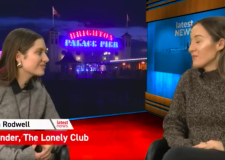Holly Would
Fair trade fashion
Last year’s Brighton Fashion Week was all about ethical fashion, so I met with Julia Hart of conciousrestyle.com last week to talk about ethical fashion and why she thinks we could all do more to help make the world of fashion fairer for workers. She is trying to urge everybody to think about where their clothes are coming from before we buy them from high street shops as some of them treat their workers poorly.
Ethical fashion basically means clothes from retailers that prioritise the human rights of their workers. England imports a lot of its high street clothing from countries such as Cambodia, Bangladesh and India. In order to make clothes to sell so cheaply on the high street, workers are exposed to poor wages, excessive hours and hazardous working places amongst other things. 
On April 24 2013, 1,113 garment makers in Bangladesh lost their lives producing clothes for the UK when their factory collapsed due to its unsafe structure. But there are many retailers in Brighton who make sure that their workers are treated fairly and are sweatshop free.
Julia said: “These shops are paving the way for other major fashion retailers by giving us a taste of how things could be, much as the early Fair Trade labels did with coffee and chocolate.”
She thinks that if everybody made more of an effort to shop from ethical retailers then, due to customer demand, the non-ethical high street retailers would start to become fairer too. My friends and I then spent the day visiting various ethical fashion stores to try out the clothes ourselves.
Our first stop was The FAIR Shop on Queens Road. They use Fair Trade cotton in their clothing and sell things made by people certified by the World Fair Trade Organisation. I was actually surprised with how nice the clothes were. I don’t know what I was expecting, but when you think of Fair Trade clothing you normally assume it’s not going to be fashionable, but all the clothes were lovely.
The prices were probably more than somebody on a student budget, like myself, could afford and perhaps the style is better suited to a more mature woman. But it definitely made me think about what, how, and where the clothes that I buy are made.
Our next stop was American Apparel in North Street. They are sweatshop-free and produce all of their clothes in one factory in Los Angeles. We were already very familiar with this store as its targeted clientele is younger people and their prices are slightly more student friendly.
The fabrics are all really soft and you can tell that the items will last longer than a lot of the cheaper stores, as they are better quality. As we headed towards the Marina cinema we took our final ethical fashion stop at the Love That Stuff store.
All of their material is hand-dyed and hand-loomed and, again, the first thing we noticed is that the material was of a higher quality than some of the usual high street stores.
Julia had said to me earlier: “Whilst some of the eco or ethical stores may be a bit more expensive than that you might find on the high street, this is only because the workers are actually being paid a fair wage for the work they do and the quality is a lot better.”
And I must admit that the clothes in the ethical shops did seem a better quality, they seem to be made to last. Whilst I can’t promise I’ll stop shopping in my regular high street stores all together, I definitely will consider buying from ethical stores when possible.





















